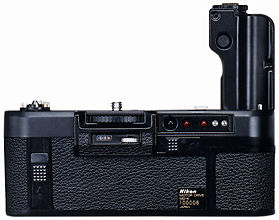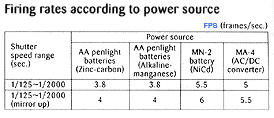 |
Specifications
|
| Camera Compatibility : | Nikon F3 | |
| Shooting modes | Choice of single-frame (S) or continuous (C) firing via S-C mode selector; lock (L) position also provided | |
| Driving mode: | Holding Trigger button depressed completes the film-advancing, as well as the shutter releasing, when S mode applied.Shutter release button of the camera shoots the motor drive on the single frame operation. | |
| Shutter release | By electromagnetic trigger button; also switches on camera meter when depressed halfway; meter remains on for 16 secs. after finger is lifted off button | |
| Number of frames available: | 36 frames(max.) | |
| Usable shutter speeds: | On S mode 8 - 1/2000 sec.
plus B On C mode 8 - 1/2000 sec. 5.5 fps. 1/250 - 1/2000 sec. 4 fps. /125 - 1/2000 sec. |
|
| Trigger button: | Depressing Trigger button half-way starts exposure metering. | |
| Mode selector: | S (Single frame), C (Continuous) and L (Lock) | |
| Remote control: | Possible; fitted with remote control terminal. Radio control set, modulite remote control set and intervalometer are available | |
| Magazine back: | Available 250 exposures MF-4. | |
| Power source: | Manganese battery (type
AA) x 8 NiCd battery (exclusively made to be installed in the MD-4) MN-2 * External source is available.** MD-4 |
|
| Firing rate | Up to 6 frames per second (fps) with NiCd Battery Unit MN-2, up to 4 fps with 8 penlight AA-type batteries; firing rates decrease at shutter speeds slower than 1/125 sec. | |
| Automatic winding stop | Motor shuts off at film's end with LED indication; frame counter also provided to automatically stop film winding after preset number of exposures—useful in very low temperatures | |
| Number of 36-exp. rolls per fresh battery | Guaranteed firing rate: approx. 60 with all types of batteries; slower firing rates, but still usable: approx. 70 with NiCd Battery Unit MN-2, approx. 100 with zinc-carbon batteries; approx. 140 rolls with alkaline - manganese batteries | |
| Automatic film rewind | 4.5 secs. with NiCd Battery Unit MN-2 and 8 secs with AA-type penlight batteries for 36 exposure film; automatic film rewind stop with optional MF-6 Camera Back | |
| Shutter speeds | 8 to 1/2000 sec. including "X" ( 1/80 sec. ) | |
| Dimensions | 146.4mm (W) x 114.7mm (H) x 70.7mm (D) | |
| Weight | 480g |
|
Power source |
Voltage |
Frames per second (fps) max. |
|
|
with mirror action |
mirror locked-up |
||
|
Manganese battery (type AA) x 8 |
12 V |
3.8 approx. |
4.0 approx. |
|
NiCd battery unit MN-2 |
16.8 V |
5.5 approx. |
6.0 approx. |
|
AC-DC Converter |
>20V |
5.0 fps (min) |
5.4 fps @ 1/250 sec |
|
Number of 36 Exposures rolls shootable: |
|
| Manganese battery | 130 approx. |
| Alkaline-manganese battery | 180 approx |
| NiCd battery unit MN-2 | 70 approx. |
|
Battery checker: Two LEDs illuminate battery life. |
|||||||||||||||||
Battery handling and other Issues relates:
1. New batteries: Between manufacturing and first use, all batteries exhibit some drain. Therefore, care should be taken to purchase the newest (and freshest) ones possible. To help you do this, some manufactures stamp the date of manufacture on the bottom of each battery. Ask your camera dealer for assistance in interpreting the codes.
2. Temperature: Battery life ratings are based on operation at around 20°C (68°F). At other temperatures, battery life is shortened. At 0°C, for instance, battery life is shortened by as much as 2/3. Spare batteries should therefore be kept available if operation in low temperatures is anticipated.
3. Continuous use: Batteries are drained much more quickly by continuous use than by intermittent use.
4. Storage: When not in use, the batteries should be removed to prevent damage from leakage. To minimize drain during the period of disuse, store the batteries in a cool, dry place.
5. Battery brands: Avoid use mixed brands of batteries, nor batteries with different model numbers. Also, avoid mixing new and old batteries since proper performance will not be obtained and battery leakage into your MD-4 may occur.
6. Disposal: Do not dispose of batteries by burning. Also, for safety's sake, do not disassemble batteries when disposing.
7. Polarity: When installing batteries, observe the voltage polarities carefully. Reversal of the positive (+) and negative (-) terminals will result in leakage. If leakage should occur, clean carefully or take your MD-4 to your dealer.
|
| | | Back to Index of Nikon F3 Models Back to Pictorial History of Nikon SLRs |
|
|||||
|
|||||||
| Back to MD-4 Main Index Page |
| Back to Index Page of Nikon F3 |
| About this photographic site | Contributions and Credits |
 |
Home - Photography in Malaysia |
